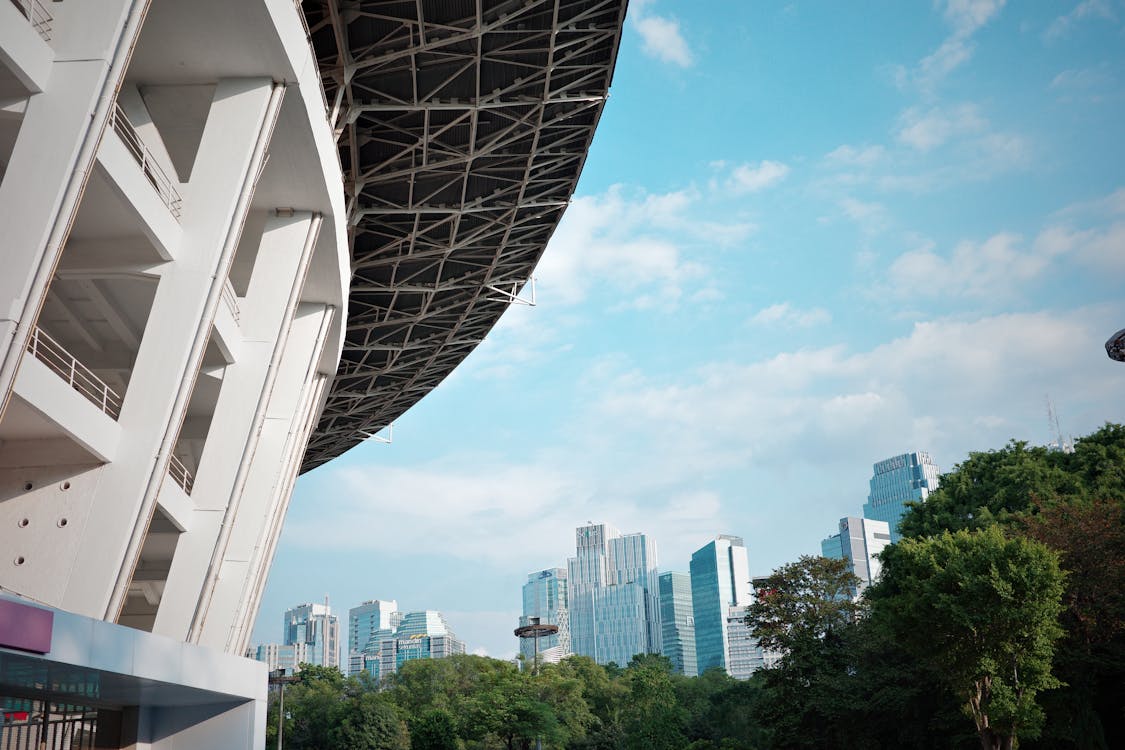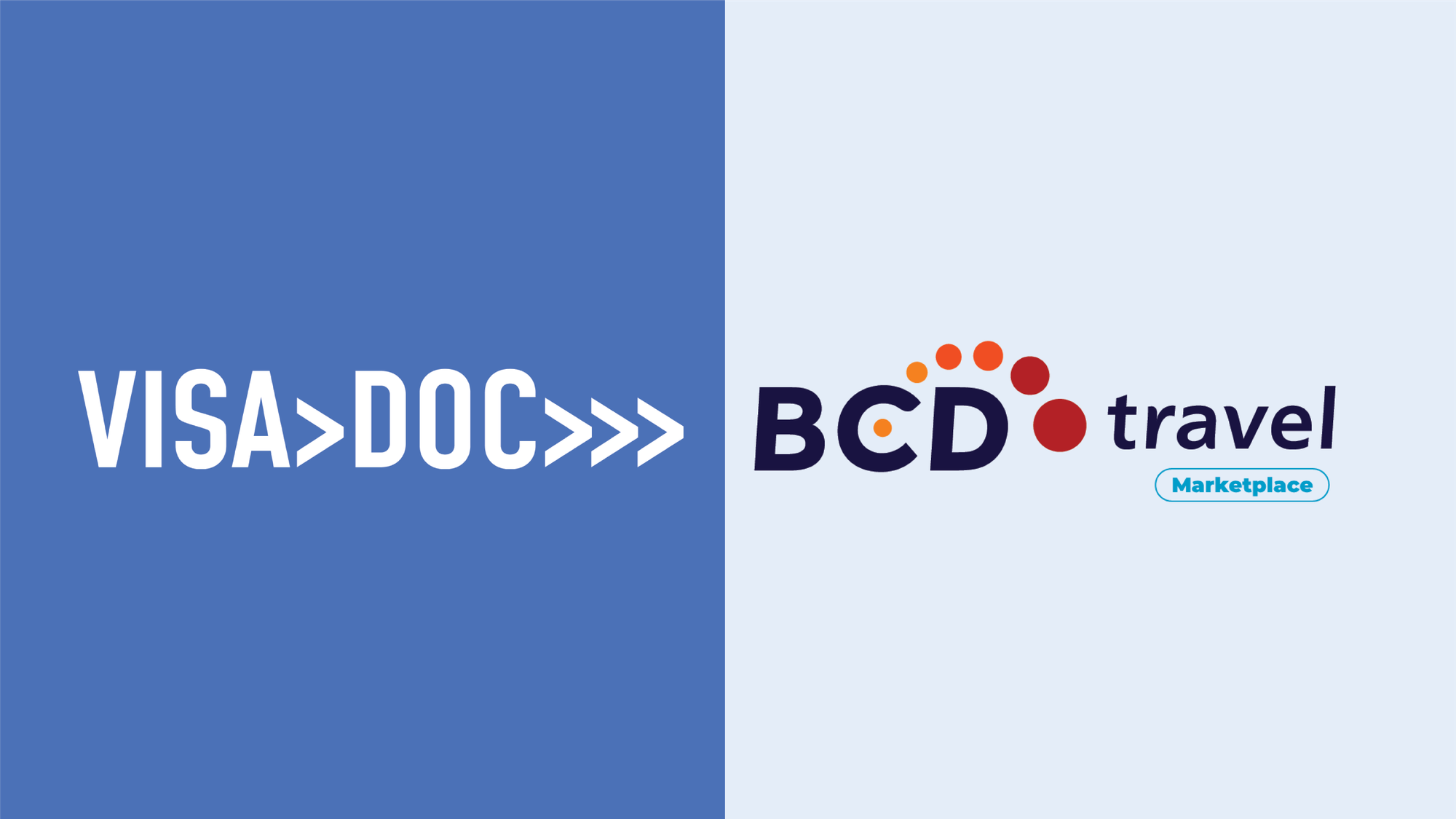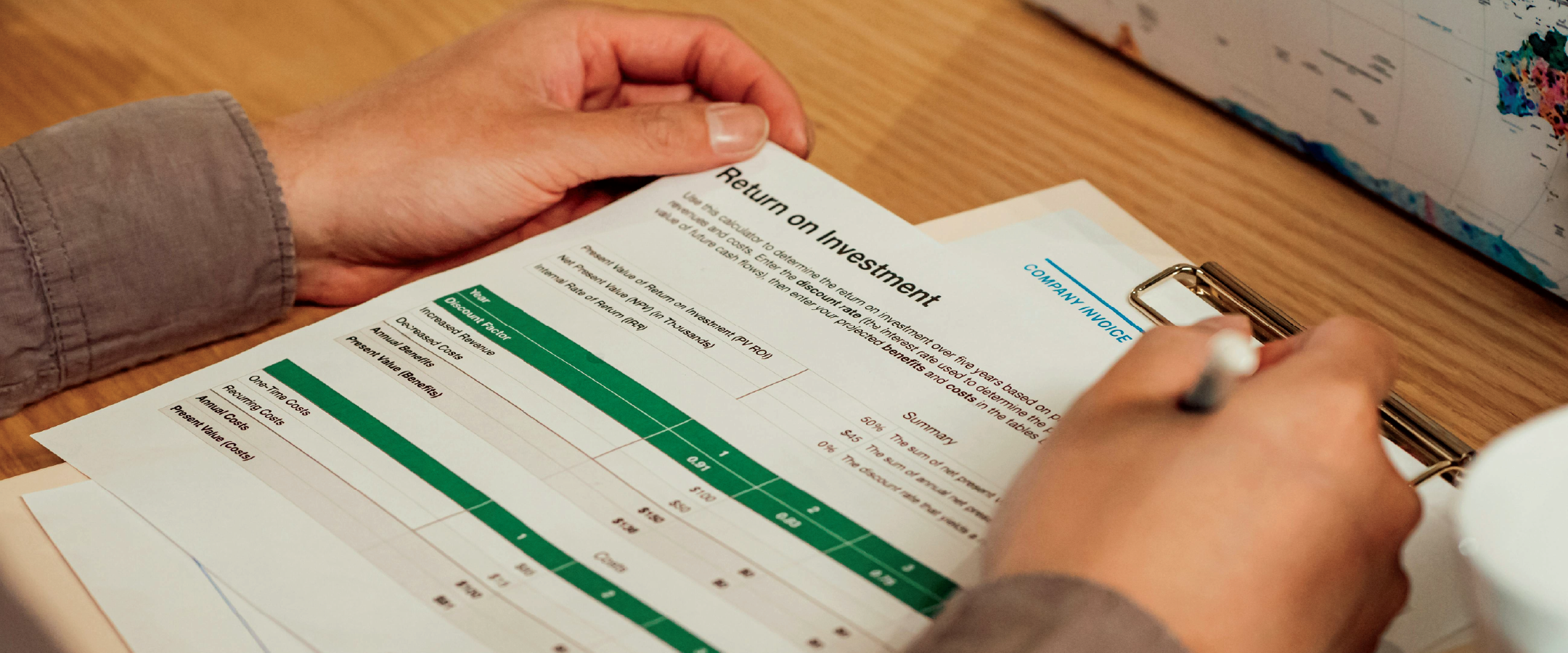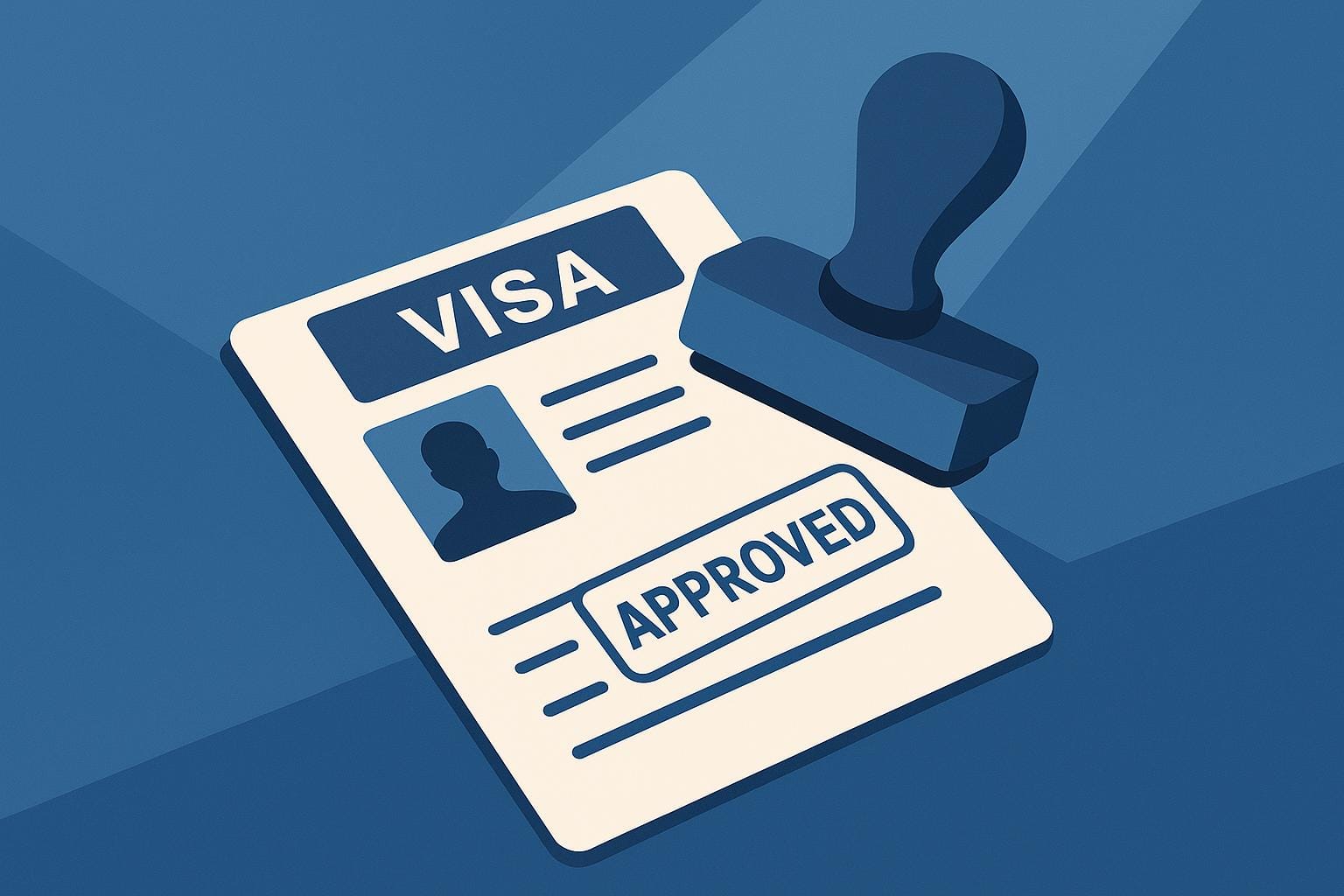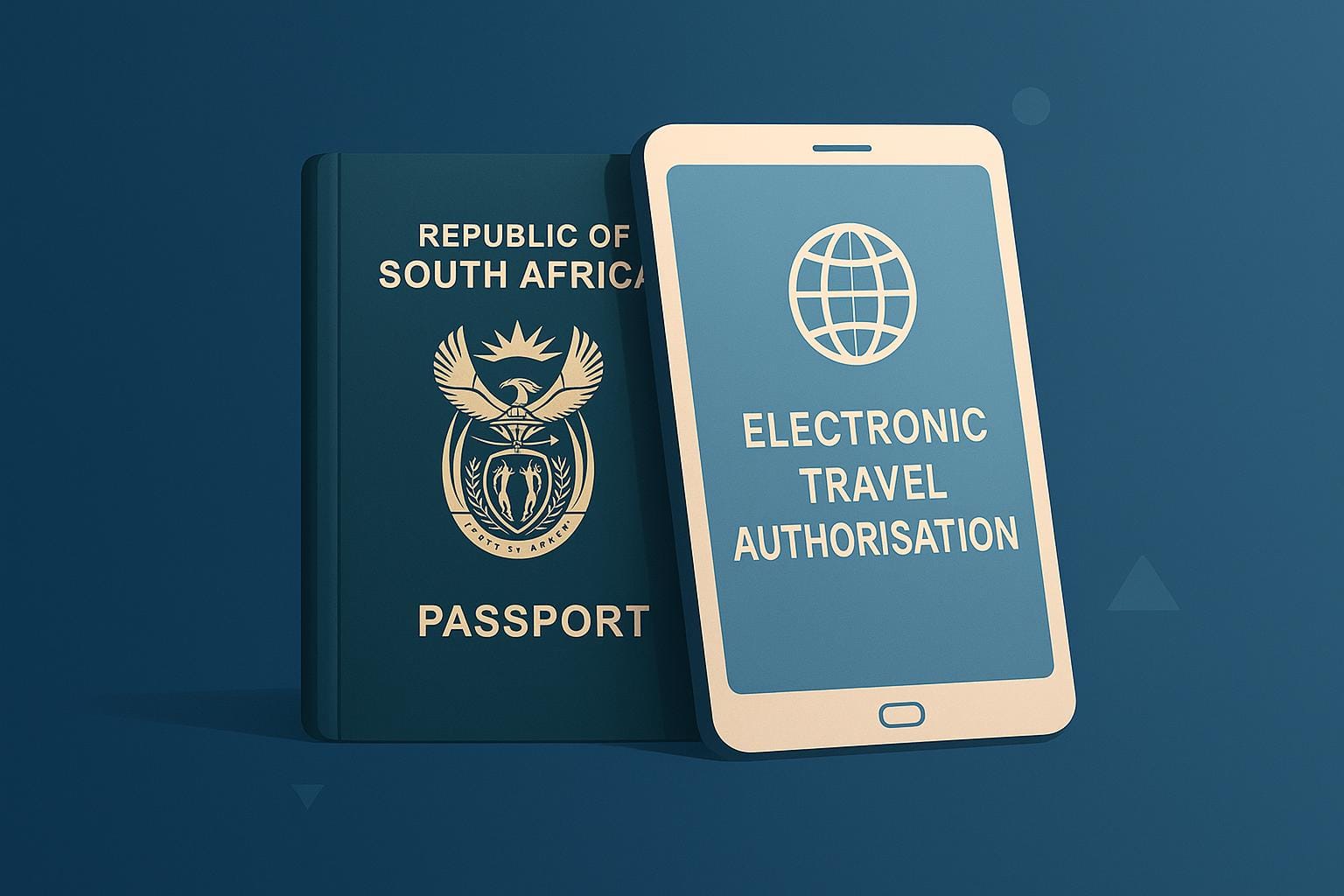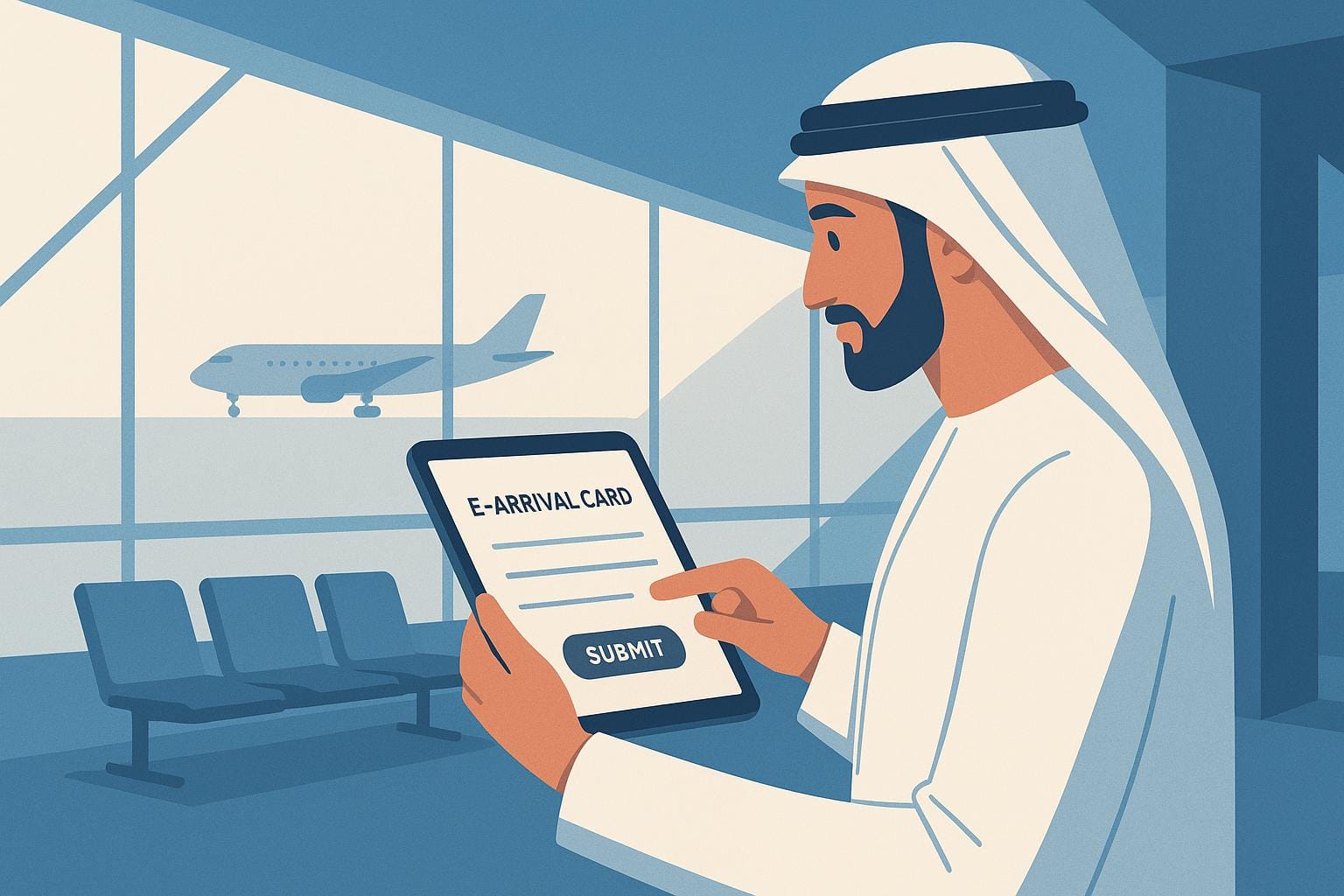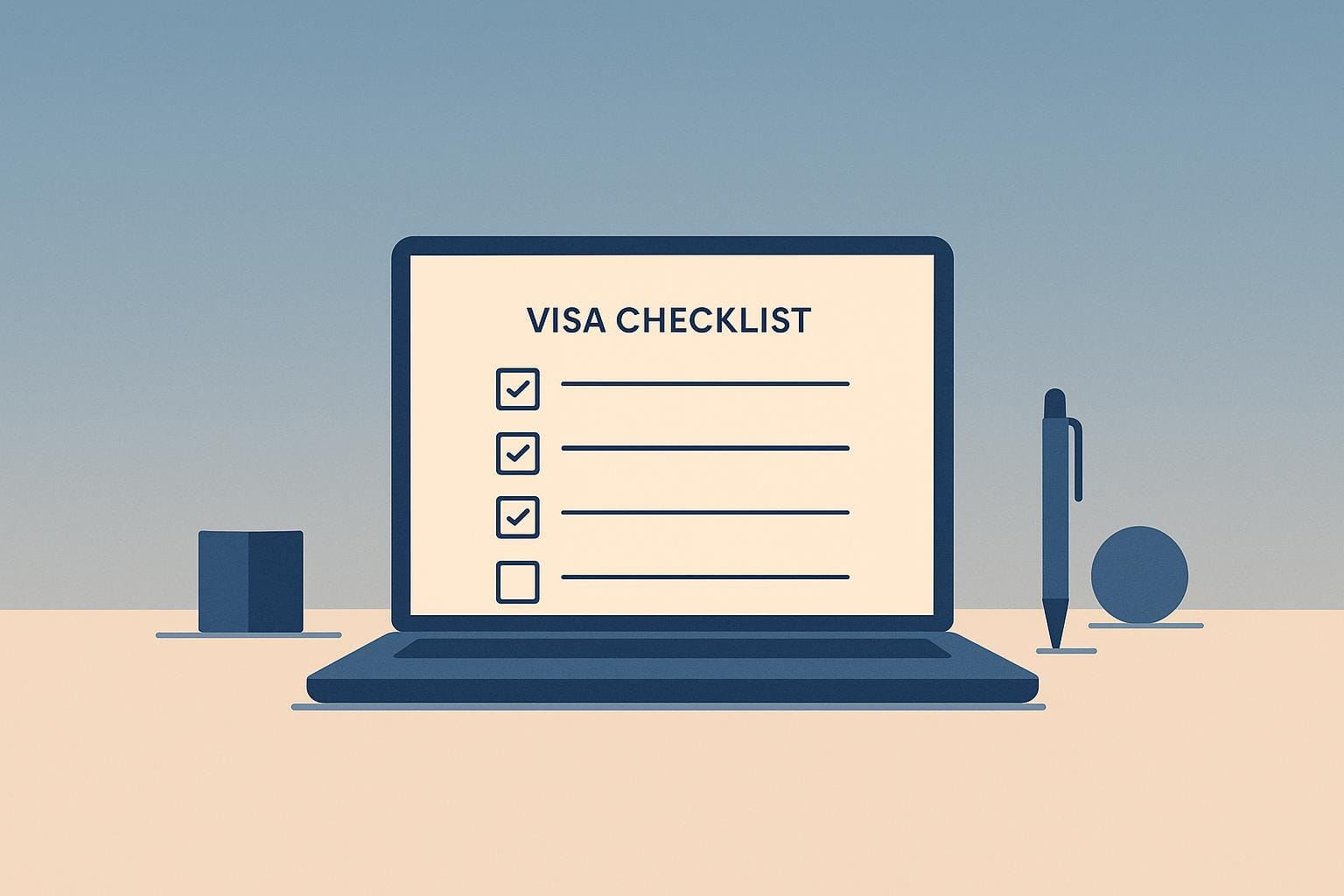Need to attend business meetings in Indonesia's financial sector? Here's what you need to know:
-
Visa Types:
- Single-Entry Business Visa (C2): Up to 60 days, extendable twice.
- Multiple-Entry Business Visa (D2): Valid for 1, 2, or 5 years; 60 days per visit.
- Visa on Arrival (B2): Short stays, no sponsor required, longer airport processing.
- Eligibility: Professionals like investment bankers, fintech entrepreneurs, and insurance executives conducting non-employment activities such as negotiations or market research.
-
Basic Documents Needed:
- Valid passport (6+ months)
- Recent passport photos
- Invitation letter from an Indonesian counterpart
- Business cover letter from your employer
- Flight itinerary
- Proof of funds (£1,600 minimum)
- Visa fee payment (£40 for single entry)
-
Financial Sector-Specific Documents:
- Investment plans or proposals (if applicable)
- Company registration documents (e.g., incorporation certificate)
- Additional permits for multiple-entry visas.
-
Costs & Processing Time:
- Fees: £110 for single entry, £220 for one-year multiple entry.
- Processing: 5–7 working days.
- Regulatory Updates: Nationals from 13 countries, including ASEAN states, now enjoy visa-free entry for up to 30 days (as of February 2025).
Important Tips:
- Apply at least two weeks ahead of travel.
- Ensure all documents are accurate and in English.
- Use automation tools like VisaDoc for faster, error-free processing.
- Avoid overstaying, as fines of £55/day apply.
Quick Comparison of Visa Types:
| Visa Type | Validity | Extensions | Cost | Sponsor Required | Processing Time |
|---|---|---|---|---|---|
| Single-Entry Business (C2) | 60 days | 2 extensions | £110 | Yes | 5–7 days |
| Multiple-Entry Business (D2) | 1–5 years (60 days per visit) | No | £220 (1 year) | Yes | 5–7 days |
| Visa on Arrival (B2) | 30 days | No | £40 | No | On arrival |
Start early, follow the checklist, and ensure compliance with Indonesian immigration rules to avoid delays.
Required Documents for Financial Services Professionals
If you're planning to secure an Indonesia business meeting visa as a financial services professional, you'll need more than just the standard paperwork. To avoid processing delays, it's essential to include specific documentation tailored to your profession.
Basic Document Requirements
Every applicant must provide the following:
- Passport: Ensure your passport is valid for at least six months beyond your planned departure date. If you're using an emergency passport or alternative travel document, the validity must extend to twelve months.
- Passport photographs: These should be taken within the last three months, with dimensions of either 3 cm x 4 cm or 4 cm x 6 cm, and a white background.
- Invitation letter: This must come from your Indonesian business counterpart, clearly outlining the purpose of the meeting, its duration, and the parties involved.
- Business cover letter: Your UK-based employer should provide a letter detailing your role, the trip's purpose, and confirmation that they will cover your expenses.
- Flight itinerary: Proof of your entry and exit dates is required.
- Proof of funds: Submit recent bank statements covering the last three months that show you have at least US$2,000 (approximately £1,600) available.
- Visa fee payment: The fee is US$50 (around £40).
For financial professionals, additional sector-specific documents are necessary.
Financial Services Sector Documents
Professionals in the financial sector must go beyond the basics by including specialised paperwork. Here's what's required:
- Investment-related documentation: If you're applying for the Pre-Investment Visa (D12), you’ll need to provide financial documentation or a detailed business proposal that outlines your investment plans. This could include a commitment to invest in Indonesian government bonds, publicly listed shares, mutual funds, or state-owned bank deposits, with a minimum value of US$10,000 (approximately £8,000). This commitment must be fulfilled within 90 days of receiving your permit.
- Company registration documents: Submit paperwork from Companies House to verify your firm's legal status. This typically includes the certificate of incorporation, memorandum and articles of association, and recent annual returns.
- Additional documentation for multiple entry visas: You may also need trading business licences (SIUP), taxpayer registration numbers (NPWP), and ministerial approvals.
Document Format and Submission Rules
To ensure your application is processed smoothly, follow these guidelines:
- Language: All documents must be in English or accompanied by certified translations.
- Submission: Use the DD/MM/YYYY date format (e.g., 13/06/2025) and submit your application via Indonesia's online e-visa portal. Alternatively, you can submit it through the Indonesian Embassy or Consulate. Some locations require in-person appointments, while others accept postal submissions - if using post, include a pre-paid, self-addressed return envelope.
- Organisation: Arrange your documents in order, starting with the basic requirements followed by sector-specific items. Use cover sheets to categorise them.
- Processing time: Applications typically take 5–7 working days, but those requiring additional verification may take longer. It's best to apply at least two weeks before your travel date.
- Special cases: For activities beyond standard meetings, such as specialised financial consultations, you may need a Letter of Approval from the Directorate General of Immigration in Jakarta.
- Immigration guarantee: Some visa categories require maintaining an immigration guarantee of US$10,000 (approximately £8,000) throughout the visa's validity.
Meeting Indonesian Immigration and Financial Compliance Rules
When applying for a visa to Indonesia, following immigration and financial compliance rules is just as important as getting your paperwork in order. Successfully navigating these requirements demands close attention to detail.
Document Accuracy Guidelines
- Verify that your Indonesian sponsor is a legally registered entity.
Financial Sector Compliance Requirements
If your visit includes discussions around investments or financial commitments, you’ll need to be well-prepared with the right documentation. For instance, the Pre-Investment Visa (D12) requires proof that you can meet investment commitments within 90 days. This includes showing access to at least US$10,000 (approximately £8,000).
Now, let’s look at some common mistakes that could derail your compliance efforts.
Common Mistakes to Avoid
- Visa Scope Violations: Business visas do not allow full-time employment or salary-based work in Indonesia. Breaking this rule can result in detention.
- Overstaying: Staying beyond your visa’s expiry date can lead to fines of 1 million Indonesian rupiah (about £55) per day. Make sure to extend your visa before it expires.
- Investment Commitment Failures: If you’re using the Pre-Investment Visa, the 90-day deadline to fulfil your commitments is non-negotiable. Missing it could block your access to the market.
- Documentation and Sponsorship Issues: Double-check that every detail in your application, from job title to sponsorship records, aligns with official documentation.
Following these rules is essential as you move forward to consider automation tools in the next steps.
Using Automation Tools for Visa Applications
Once your documents meet Indonesian visa requirements, automation can simplify the application process. By integrating approved documentation into automated systems, you can minimise delays and reduce errors, making the entire process smoother.
How Automation Benefits Financial Services Teams
Financial services companies often juggle multiple visa applications, especially when managing cross-border meetings or negotiations. Automation offers significant advantages in this context. Research shows that 73% of finance professionals report increased efficiency with automation, 34% of knowledge workers see fewer errors, and businesses can save 70–80% of their time. Additionally, automation helps recover around 20% of travel budgets and enables 88% of small business owners to compete more effectively.
For teams handling Indonesian business meeting visas, automation translates into faster processing times. In fact, 66% of knowledge workers in small to medium-sized businesses say automation allows them to focus on creative and strategic tasks rather than repetitive paperwork. This shift is especially valuable in financial services, where optimising time for strategic travel planning can significantly improve productivity.
Features of the VisaDoc Platform
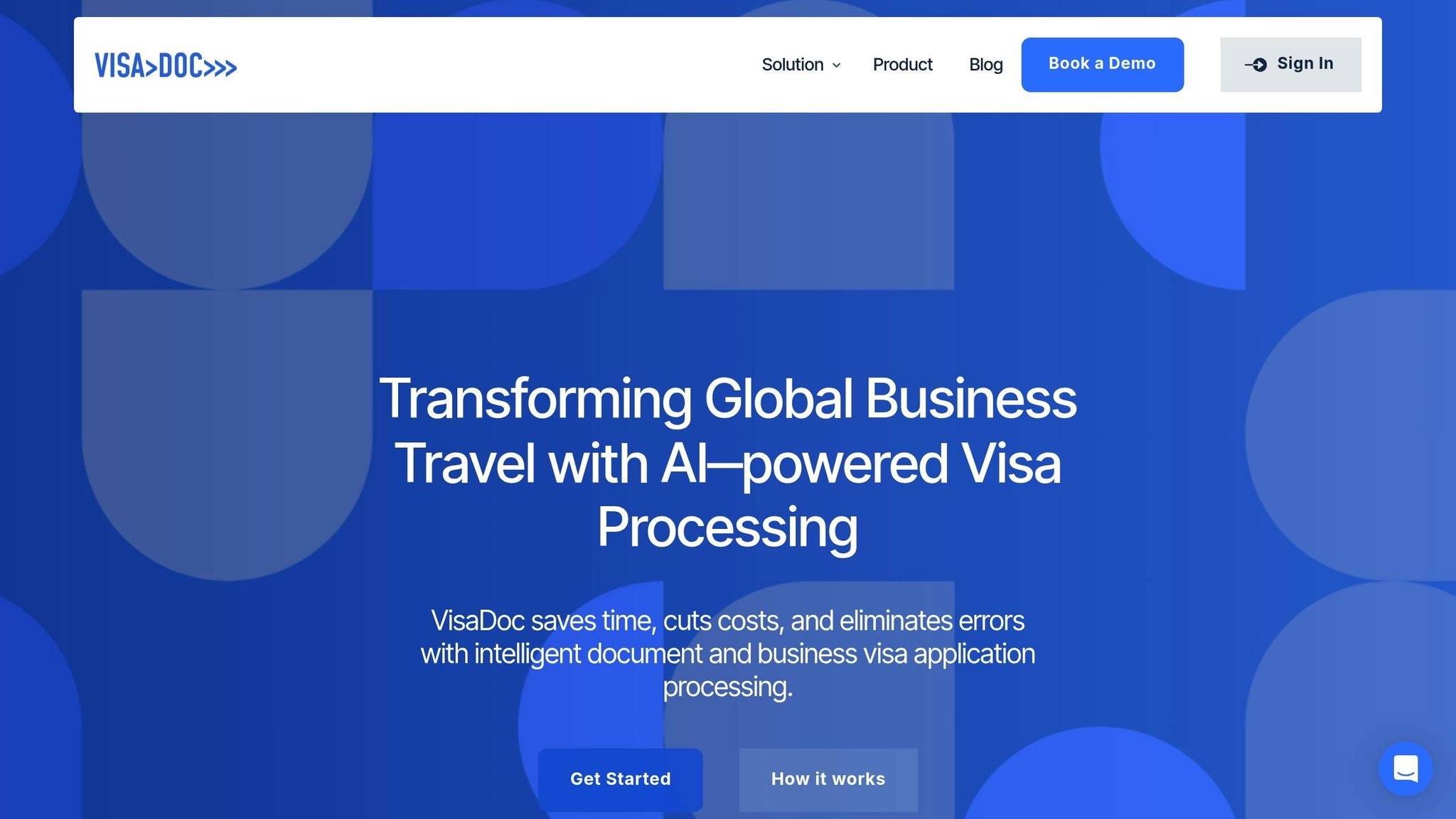
VisaDoc is designed specifically for financial services professionals, offering tailored visa guidance and automated processing. Its features ensure that visa applications meet both Indonesian immigration rules and financial sector compliance standards.
- AI-Powered Document Verification: Automatically checks submitted documents against Indonesian visa requirements, flagging potential issues before submission.
- Automated Compliance Checks: Keeps applications aligned with the latest immigration and financial regulations by continuously updating requirements, saving HR teams from manually tracking changes.
- Integration with Existing Systems: Syncs with HR and travel booking tools, eliminating duplicate data entry and ensuring consistency across all travel-related documents.
- Real-Time Tracking and Notifications: Provides clear, up-to-date visibility into application statuses.
- Supporting Document Generation: Automatically creates letters and forms tailored to each application’s details.
These features streamline the visa process, reducing administrative burdens and ensuring compliance at every step.
Comparing Manual and Automated Processes
Automation offers clear advantages over traditional manual methods. The table below highlights the key differences:
| Aspect | Manual Process | Automated Process (VisaDoc) |
|---|---|---|
| Processing Time | Lengthy back-and-forth communication. | Faster, with near real-time updates. |
| Accuracy | Prone to human errors during data entry. | Improved accuracy with automated verification. |
| Compliance Tracking | Requires manual monitoring of regulation changes. | Automatic updates and built-in compliance checks. |
| Document Management | Relies on physical files or unstructured storage. | Centralised digital repository for organised access. |
| Status Visibility | Limited tracking, often via calls or emails. | Real-time tracking through a digital dashboard. |
| Cost Efficiency | Higher costs due to manual processes. | Lower costs through streamlined workflows. |
| Scalability | Needs more staff as application volume grows. | Scales easily without additional resources. |
When time is critical, such as during urgent negotiations, automation ensures faster processing and allows HR teams to focus on strategic tasks rather than being bogged down by routine paperwork. Unlike manual processes, which can lead to delays and inefficiencies, automated systems provide a seamless, efficient alternative, making them essential for error-free visa management in time-sensitive situations.
Solving Common Visa Application Problems
Even with careful planning, visa applications can hit unexpected snags that disrupt travel plans or business negotiations.
Handling Last-Minute Changes and Rush Applications
Sometimes, urgent visa needs pop up due to sudden schedule changes or accelerated business deals. A common challenge in Indonesia is its holiday calendar. Major religious events like Nyepi and Eid al-Fitr often result in temporary closures of visa processing services, causing delays for those who don’t plan ahead.
To avoid these setbacks, HR teams should aim to complete visa applications or renewals well before holiday periods. In cases where a rush application is unavoidable, focus on accuracy over speed. Always use Indonesia’s official eVisa website for applications and extensions. Having standard document templates - like invitation letters, company guarantees, and financial statements - ready to go can save valuable time.
For C1 visas, which allow up to 180 days of stay, it’s a good idea to start the extension process at least 10 days before the visa expires.
Fixing Incomplete Documentation Issues
One of the most common reasons for visa rejections is incomplete or incorrect documentation - think passport typos, missing details, or mismatched forms. To reduce the risk of errors, create a checklist tailored to Indonesia’s financial sector requirements.
If your application is rejected due to missing documents, act quickly to provide the necessary information for reassessment. In cases where circumstances have significantly changed since the initial submission, applicants may reapply. For more complex scenarios, such as when multiple travellers are involved or negotiations are sensitive, consulting an immigration attorney can be invaluable.
Staying informed about regulatory updates is another key step to avoiding documentation issues.
Keeping Up with Regulation Changes
Indonesia’s immigration policies are frequently updated, and how they’re applied can vary depending on the local immigration office. Changes in procedures often take time to filter through, leading to inconsistencies between different entry points.
To stay compliant and avoid penalties - such as fines, imprisonment, or even licence revocation - companies should regularly review updates via official government channels. Setting up systematic monitoring processes can help manage visa applications more effectively.
Automation tools can also be a game-changer. For instance, VisaDoc’s automated alert system tracks regulatory changes that may impact financial sector negotiations. This ensures your team stays informed without the need for constant manual checks. The system adjusts compliance checks to align with new requirements, reducing the likelihood of submitting outdated information.
To further support compliance, regular training sessions and workshops for HR teams are highly beneficial. Employers must also notify the Immigration Department of any changes in an employee’s job title, responsibilities, or salary to keep visa documentation accurate and up to date.
Key Steps for Successful Indonesia Visa Applications
Applying for an Indonesia business meeting visa, especially for financial services negotiations, requires careful planning and attention to detail. A systematic approach can help minimise the chances of delays or rejection while ensuring you meet all immigration requirements. Here are the key steps to keep in mind:
Start early and plan ahead. Begin your application process at least 14 days before your intended arrival date.
Double-check document accuracy. Make sure every field in your application is completed correctly. Mistakes or missing information can lead to delays or rejection. Use the document checklist provided earlier to ensure your passport validity, proof of funds, and other requirements are in order.
Secure proper sponsorship and travel arrangements. Your Indonesian business partner must provide all necessary sponsorship documentation as detailed in the earlier requirements section. Additionally, ensure your flight itinerary meets the travel proof standards discussed previously.
Adhere to Indonesian regulations. Indonesia enforces strict immigration laws, and violations can lead to fines, deportation, or even blacklisting. Be aware of specific investment requirements for certain business sectors and select the correct visa type. Remember, a Visa on Arrival is strictly for tourism purposes.
Leverage automation for efficiency. Streamlining the application process can save time and reduce errors. For example, VisaDoc offers tools like intelligent document management, automated status tracking, and customisable workflows to ensure compliance.
Stay informed about policy updates. Immigration regulations in Indonesia are subject to frequent changes. As of 2024, the country has introduced an e-visa system to simplify the process. Always check the latest business visa fees and updates on the official Indonesian embassy or consulate website. Platforms like VisaDoc can also provide compliance alerts to help you stay on top of these changes.
Plan for extensions if needed. If there’s a chance your business negotiations could extend beyond your visa’s validity, start the extension process before your current visa expires. Early action and consistent monitoring are critical to avoiding disruptions.
FAQs
What documents do financial professionals need for a multiple-entry business visa to Indonesia?
Financial professionals planning to apply for a multiple-entry business visa to Indonesia must have the following documents ready:
- A valid passport with at least 18 months of remaining validity.
- A sponsor letter from an Indonesian company or guarantor.
- Bank statements or proof of deposit showing a minimum balance of $2,000 (£1,600).
- A return flight booking.
- A recent passport-sized photograph (taken within the last three months) with a plain white background.
- Proof of full Covid-19 vaccination.
- Evidence of health insurance or a signed statement confirming that you’ll cover medical expenses on your own.
Make sure all documents are accurate and up-to-date to avoid any potential delays. Requirements can sometimes vary depending on the embassy or consulate in your area, so it’s wise to double-check with them before submitting your application.
How can VisaDoc simplify the process of obtaining an Indonesian business meeting visa for professionals in the financial services sector?
VisaDoc simplifies getting an Indonesian business meeting visa by automating essential steps like organising documents, verifying compliance, and tracking applications. It ensures all paperwork is properly prepared and adheres to the latest regulations, reducing the chances of mistakes or delays.
With real-time updates on the application status, HR teams and corporate travel managers can save time and concentrate on more pressing tasks. This streamlined process not only improves efficiency but also makes the visa application journey smoother and less stressful, all while staying aligned with Indonesia's regulatory requirements.
What happens if I overstay my business visa in Indonesia, and how can I prevent it?
Overstaying your business visa in Indonesia comes with serious consequences. You could face a daily fine of IDR 1,000,000 (roughly £55), deportation, a ban on re-entry, or even imprisonment if your overstay exceeds 60 days. It's crucial to act quickly if you find yourself in this situation to limit any further penalties.
To avoid overstaying, here are some simple but effective steps:
- Keep track of your visa’s expiry date to stay ahead of deadlines.
- Apply for an extension well before your visa runs out.
- Set reminders in your calendar to ensure you don’t miss important dates.
If you're unsure about the process or want to avoid any mistakes, consulting immigration experts can help you stay on the right side of the rules and give you some extra peace of mind.
Related Blog Posts
- India Business Travel Guide: Visas, Permits, and Cultural Tips for Success
- UAE Business Meeting Visa Express: 14-Day Entry Options for Executive Delegations
- Site Inspection Visits to Manufacturing Facilities in Vietnam: Business Visa Documentation Requirements
- Contract Negotiation Trips to South Korea: Short-Term Business Visa Application Strategies



